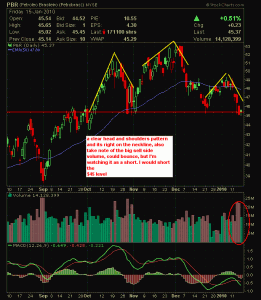{+++}
It was a tale of three earnings this week, as mixed quarterly reports from Alcoa and JP Morgan and very strong results from Intel shook up equity trading. There were bright spots in all three reports, as well as decidedly darker data out of Alcoa and JP Morgan. Shares of all three giants and the broader indices lost ground after each report was released, and many noted the sell on the news scenario so evident following the strong Intel results could be a harbinger to a difficult earnings season still ahead. China was the other major factor, with record economic data and an initial policy tightening moving markets. December trade data showed that China has become the world’s biggest exporter, replacing Germany, while auto sales numbers indicated that China has displaced the US as the world’s biggest automobile market. In Washington, the newly convened Financial Crisis Inquiry Commission provided a steady stream of drama mid week, as Chairman Angelides grilled bank CEOs.
Alcoa missed earnings targets on Tuesday, and that was before hefty one-time restructuring charges. Revenue was well ahead of expectations, although investors are evidently shaken by selected sequential declines in various income segments.
Intel reported one of the most profitable quarters in its history on Thursday evening, beating earnings and revenue targets and racking up a stunning gross margin of 65%, with similar results expected next quarter as well. On the conference call, Intel’s CFO said consumer demand has returned to normal levels and is driving PC demand, while also warning that businesses are not purchasing PCs. Despite the outperformance, shares of INTC were down nearly 3% on the day on Friday.
P Morgan offered a mixed earnings report on Friday morning, featuring strong bottom-line outperformance, a big revenue miss and disturbing trends in mortgage and card loans. Revenue was off primarily due to a big sequential decline in investment banking revenue. Losses were seen in both mortgage and credit card lending. The firm expects losses at Chase card unit to only increase next quarter, while losses at WaMu unit could climb dramatically. CEO Dimon said that “while we are seeing some stability in delinquencies, consumer credit costs remain high, weak employment and home prices persist. Accordingly, we remain cautious.” Citigroup was out on Friday with a similarly dire outlook, warning that it expects $1B in credit card losses in the first half of 2010.
In currency trading, the greenback began the week on a soft note in the aftermath of the prior week’s US payroll data and China’s strong December trade reading. The euphoric sentiment that characterized early January continued to wane as the dollar suffers from the double whammy of lower yields in two-year instruments and dented prospects for economic recovery.
The Greek sovereign debt situation continued to deteriorate. The Greek PM reiterated that Greece was not seeking any IMF bailout or planning to exit the Euro Zone, but then again he provided practically no details on how the country would finance its budget or drastically cut its debt-to-GDP ratio in order to meet the EU’s criteria.
Fresh evidence of strong economic recovery and a surprise reserve requirement hike put China in the macro spotlight. China’s robust December trade figures saw exports rise for the first time in just over a year (+17.7% y/y) and imports advance at an all-time high pace of expansion of +56% y/y. Interestingly, the data showed China has become a net importer of fuel, in yet another sign of growing domestic demand.
Some of our stocks are reporting this week: IBM,GS, and JEF, more next week. The market tagged 1150 intraday last week, was that the sell signal or was it just the “pause” signal? INTC was good, JPM wasn’t that bad and AA was lousy, so we’ve seen a mixed to slightly negative release of earnings. I lowered the stop on GS as I still have conviction, it hit the number by 30 cents on Friday and I’m still long.
Please view the spreadsheet for any changes in our stops. One new addition tonight
PBR-short

